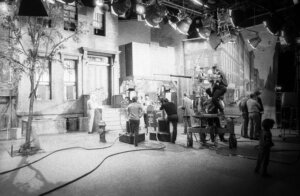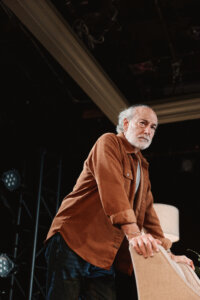From a Jewish home in Queens to ‘Sesame Street,’ Broadway, ‘Succession’ and ‘Job’
Fresh from completing four seasons as vice-chairman of Waystar Royco, Peter Friedman is starring in an Off-Broadway thriller

Peter Friedman and Sydney Lemmon star in ‘Job.’ Photo by Emilio Madrid
Sometimes it’s not who you know. It’s who your daughter knows.
Peter Friedman, star of Job, a tense, thoughtful psychological thriller now playing at the Connelly Theater, is coming off what he concedes are the best years — at least financially — of a career that spans over five decades.
Famously, he spent four seasons as Frank Vernon, Vice Chairman of Waystar Royco on Succession. Last year, he also had a six-episode arc on The Marvelous Mrs. Maisel, as the producer of a late-night talk show. Yet here he is working in a relatively tiny theater on Manhattan’s Lower East Side, closer to Katz’s Deli than Broadway.
“My daughter, Sadie went to Hebrew school with one of the young producers,” Friedman, 74, told me over Zoom. “They’ve always kept in touch and when she heard about the script she said why don’t you send it to my dad.”
“The dialogue had no bumps,” he said. “It made total sense to me. It was smart. It was certainly smarter than I am, and I wanted to be associated with it.”
Friedman plays Lloyd, a crisis therapist who, as the play opens, is confronted by a new and clearly troubled patient who’s holding him at gunpoint. She’s Jane (Sydney Lemmon), a content moderator for a large tech firm. Her job is to monitor the worst of the web and, unsurprisingly, constant exposure to the vile and worst of humanity gets to her. She has a breakdown at work, which, of course is filmed and then posted on the web.
Her company places her on paid leave, but Sydney — who feels her job is critical — is determined to return to work. But she needs psychiatric approval to do so. Hence, the visit to Lloyd’s office with the gun to speed his approval.

Over the course of the stressful 80-minute production, Lloyd calms Jane down, learns more about her, including plans to go after offenders, all leading to an unsettling and surprise denouement that has audience members question everything.
I’d met Friedman briefly in the theater lobby a couple of days before we Zoomed and I asked him about the ending (he told me I had to make up my own mind about what it meant) and about who stops him in the street. Is it young people for Succession and older folks who recall his role in? Yes, he said with a smile.
Back on Zoom, we spoke about Frank Vernon, who was fired in the first episode of Succession leaving Friedman wondering whether he was going to be unemployed in real life, too.
“All I had to go on was the pilot script,” he said. “At my echelon, you have to decide based on the pilot script. The idea at that point in my life, after doing all those plays” — he’d been nominated for a Tony for his role in Ragtime and had appeared in Wendy Wasserstein’s Heidi Chronicles, among many productions — “was anathema to me. You don’t know how they are going to use you. They can forget about you.”
Still he signed on and, he added, “after HBO picked up the series, they made me a regular.”
It was in many ways, it was the opposite of his experiences on Brooklyn Bridge. “There was something about the Brooklyn Bridge pilot, where my character appears for only the last two minutes. But I knew right away this was for me.”

The show, which ran for two seasons, from 1991 to 1993, was about a Jewish family in mid-1950s Brooklyn and was largely based on the life experiences of its creator, Gary David Goldberg. Friedman, 74, played the father, postal worker George Silver.
I wondered if Friedman’s experiences growing up in New York mirrored those in the show. They didn’t. He grew up the son of a stay-at-home mom and a CPA in “a nice big house in Queens.”
“But my parents came from Bensonhurst. So before we started filming, I said OK, take me on a tour to your childhood neighborhood,” Friedman recalled. “They were at the JCH [Jewish Community House] all the time. Just like Gary David Goldberg would talk about. The JCH was the hub of their existence.”
I mention that Goldberg once told me how upset he was that the show was cancelled. Friedman said he understood. “Our first night [on the air], you know, we were on Shabbos — thanks a lot. Then the World Series and we were pre-empted like three weeks in a row. Then we’re on Thursday and then we’re on Sunday. And then in the second season they asked can we get away from the family, which is what the show was all about.”
Though Friedman has prospered recently in the business, it wasn’t always that way. His first years were slow and he found work on Sesame Street where he played a carrot who tried to teach Gilbert & Sullivan to Gilda Radner. He also served valiantly as the rear end of Mr. Snuffleupagus, an extra large Muppet that inhabited the same neighborhood as Oscar the Grouch and Big Bird, earning $50 an episode.
“I wore a t-shirt and shorts because it was hot in there,” he said. “I took my 50 bucks and left. At 28, I was happy to do that.”
Job runs through Mar. 3 at the Connelly Theatre.




















